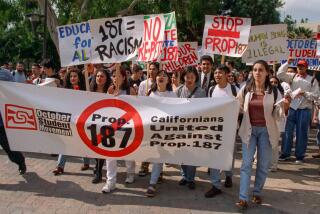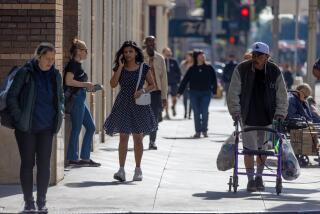Census Chief Says Errors Threaten California
The outgoing director of the U.S. Census Bureau warned Wednesday that unless the government revises its handling of the 2000 census, hundreds of thousands of Californians could be overlooked, harming the state economically and politically.
Census Bureau Director Margaret Farnsworth Riche, in a visit to Los Angeles, said that the upcoming count could be even more flawed than the 1990 census, which failed to count almost 1 million Californians and missed more Americans than ever.
In Los Angeles, where fear of deportation keeps many immigrants from participating in the census, “There are more immigrants than in 1990 and there may be a more hostile atmosphere. Los Angeles may have an even harder time than 1990,” she said.
Demographers believe minorities and the urban poor account for most of those missed in direct census counts. Riche resigned as Census Bureau director Jan. 12, and will leave her post at the end of the month. The demographer had pushed for the use of sampling--a statistical method that would directly count 90% of the population and project from that tally the 10% that demographers view as nearly impossible to count.
The method has been recommended as a census tool by the National Academy of Sciences and other scientific groups. It is backed not only by minority advocacy groups, but by many companies and trade groups that rely on census data for market research.
Sampling is opposed by congressional Republicans, who privately worry the method would result in more pro-Democratic congressional districts.
Speaking at a Los Angeles news conference in the offices of the Mexican American Legal Defense and Education Fund, Riche again emphasized the Census Bureau’s desire to use sampling. “We’d like to go with the method used by leading statistical agencies and other industrialized countries [like] England,” she said.
Joining Riche in her call for sampling were Reps. Xavier Becerra and Lucille Roybal-Allard, both Los Angeles Democrats.
Becerra said that in his congressional district --where 40% of residents were born outside the United States--many have told him they are afraid of contact with the federal government. “They don’t say, ‘The IRS does this, the INS handles this.’ They just know the federal government conducts raids,” he said.
Roybal-Allard said Republican fears that census sampling would strengthen the Democratic Party “have no basis,” noting that many immigrants are Republicans. She emphasized, however, that science, not politics, should determine how the census is conducted. “It should be about getting an accurate count, not whether more Democrats will get elected.”
Poor census data could also hamper economic growth in undercounted areas, Roybal-Allard said. “Latino consumers have tremendous economic power, and businesses need that data to decide where they’ll move and to target their products,” she said.
Inaccuracy in the 1990 census might have cost California $500 million in federal funds and one congressional seat, census experts have said. The Census Bureau estimates that nearly 4% of Los Angeles County residents were missed in 1990, and about 1.6% of the population was not counted nationwide.
Antonia Hernandez, MALDEF president and general counsel, said the organization is starting an education program to get more Latinos to return census forms. “We have to be aggressive in ensuring confidence so people realize there’s no connection between the Census Bureau and the Immigration and Naturalization Service,” she said. Hernandez said fear of deportation may be greater today than in 1990, since anti-immigrant sentiments may be stronger.
More to Read
Sign up for Essential California
The most important California stories and recommendations in your inbox every morning.
You may occasionally receive promotional content from the Los Angeles Times.









